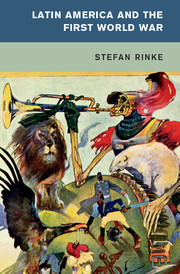Book contents
- Frontmatter
- Contents
- List of Figures
- Preface
- List of Abbreviations
- Introduction
- 1 The Global Context before 1914
- 2 Neutrality under Pressure, 1914-1917
- 3 In the Wake of War, 1917
- 4 Turbulent Paths into a “New Era,” 1918-1919
- 5 The Demise of a World
- 6 Nation and Trans-nation
- Epilogue: The Global Legacy of the World War
- Sources and Literature
- Chronology
- Index
Introduction
Published online by Cambridge University Press: 09 March 2017
- Frontmatter
- Contents
- List of Figures
- Preface
- List of Abbreviations
- Introduction
- 1 The Global Context before 1914
- 2 Neutrality under Pressure, 1914-1917
- 3 In the Wake of War, 1917
- 4 Turbulent Paths into a “New Era,” 1918-1919
- 5 The Demise of a World
- 6 Nation and Trans-nation
- Epilogue: The Global Legacy of the World War
- Sources and Literature
- Chronology
- Index
Summary
It is strangely still on the harbor and in the markets. And for several days already, the theater and cinemas have been empty. The noise levels, however, have increased in front of the offices of the major newspapers, where masses of people have come together already at the crack of dawn to hear the latest news. When sirens sound to announce important news off the wire, orators spontaneously stand up to either condemn the war or take sides with one of the two parties. Streetcars are no longer able to pass through the streets. The air pulsates with rumors, as word spreads that the Austrian Emperor has fallen prey to an assassination attempt. Huddling together before the closed gates of banks, frustrated customers curse loudly. How was one to pay the exploding prices if you couldn't get to your money, or if your job was all of a sudden at risk like never before? All over, unemployed from the lower classes flock together, with more coming each day from the countryside. There, large foreign mining and plantation companies dismissed thousands overnight.
Meanwhile, uniformed marines and reservists from various countries march through the streets in formation. They intend to report to their consulates for military service. A few streets away, demonstrators singing the Marseillaise and “God save the Queen” tramp toward the diplomatic embassies of the Allies to proclaim their sympathy. At about the same time, vocal socialists demonstrate in favor of restoring peace. The faithful follow suit in their own way by joining pilgrimages for peace. Politicians, business owners, and bankers gather in the ministries to consult with each other about what to do next, without however finding an answer. A sense of unrest prevails far and wide, as the police institute measures to maintain public order. It is as if people are simply waiting for the storm, whose rumbling thunder is heard in the distance, to unleash a bolt of lightning and inflict unimaginable devastation.
According to the press of the time, similar scenes played out with greater or lesser intensity throughout the cities of Latin America in August 1914. When news broke of the war in Europe, there was talk of a catastrophe that, because of the close-knit global entanglements, would embroil the world in an unprecedented crisis.
- Type
- Chapter
- Information
- Latin America and the First World War , pp. 1 - 13Publisher: Cambridge University PressPrint publication year: 2017



